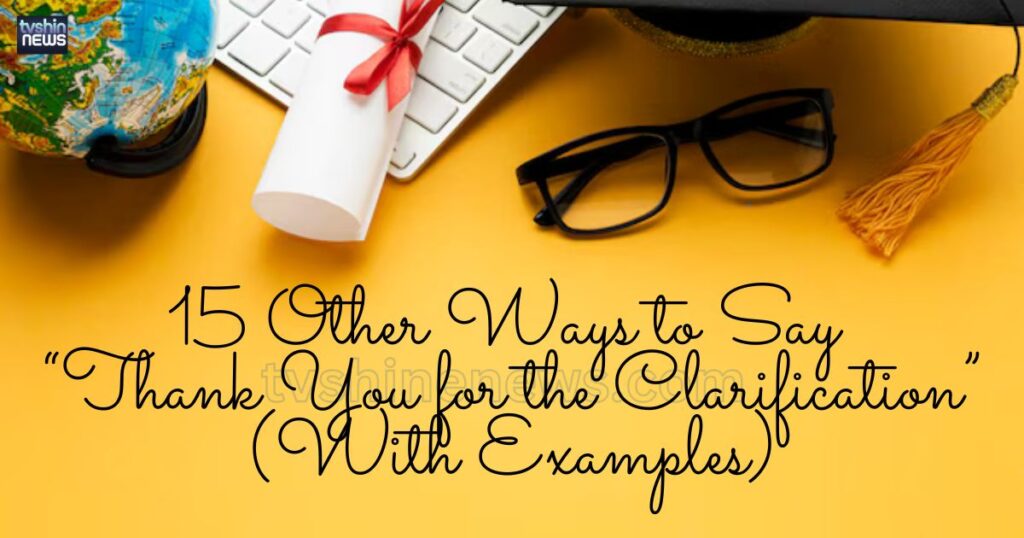Clear communication forms the bedrock of successful professional relationships, and knowing how to express gratitude for clarification plays a vital role in this dynamic.
In today’s fast-paced business environment, the ability to acknowledge and appreciate when someone takes the time to explain something thoroughly can significantly impact workplace relationships and overall communication effectiveness.
Why Finding Alternatives Matters
The importance of varying your expressions of gratitude extends far beyond mere politeness. When you’re consistently finding fresh ways to say “thank you for the clarification,” you’re demonstrating emotional intelligence and creating meaningful connections with colleagues.
These alternative expressions serve as powerful tools for relationship-strengthening language and help establish a positive workplace culture where clear communication is valued and encouraged.
In professional settings, the way we express appreciation can significantly influence how our messages are received. Using diverse phrases for showing appreciation helps avoid the monotony of repetitive expressions while showcasing your communication sophistication.
Moreover, thoughtful acknowledgment encourages others to continue providing detailed explanations when needed, fostering an environment of open dialogue and mutual understanding.
Alternative Expressions with Context and Examples
Thanks for Clearing That Up
In professional environments, this casual yet appropriate phrase works particularly well in team discussions. For instance, during a project meeting, you might say, “Thanks for clearing that up about the quarterly targets.
Your explanation helps me understand how my department’s goals align with the broader organizational objectives.” This approach demonstrates positive interaction strategies while maintaining professionalism.
I Appreciate the Detailed Explanation
This phrase carries more weight in complex technical discussions or when receiving comprehensive information. Consider using it when a colleague has taken significant time to break down a complicated process: “I appreciate the detailed explanation of the new CRM implementation.
Your step-by-step breakdown has given me a much clearer picture of how to proceed with client data migration.”
Thank You for the Insight
When someone provides not just clarification but also adds valuable perspective, this phrase acknowledges their deeper contribution. For example: “Thank you for the insight into how the market fluctuations affect our pricing strategy. Your industry experience adds valuable context to our planning process.”
Maximizing Impact: Strategic Implementation

Understanding when and how to use these expressions effectively requires consideration of various factors. The context, relationship dynamics, and communication channel all play crucial roles in selecting the most appropriate phrase. Here’s a comprehensive breakdown of implementation strategies.
Professional Settings: Consider the formality level required for different situations, from client meetings to casual team check-ins. Your choice of expression should align with the professional context while maintaining authenticity.
Communication Channels: Different mediums require different approaches. Email communications might benefit from more formal expressions, while video calls allow for a slightly more relaxed tone supported by visual cues and voice inflection.
Advanced Tips for Expressing Gratitude
To maximize the impact of your appreciation, consider these advanced strategies for conversation improvement techniques:
Context Awareness: Always tailor your response to match the situation’s formality level and the relationship you share with the person providing clarification.
Specificity Matters: Reference specific aspects of the clarification to demonstrate active listening and genuine appreciation.
Cultural Considerations: In international business settings, be mindful of cultural nuances that might affect how your gratitude is perceived.
The Psychology Behind Expressing Gratitude Professionally
Expressing gratitude in professional settings isn’t just about good manners; it also taps into the psychological principle of reciprocity. When you thank someone for clarifying a point, you’re not only acknowledging their effort but also fostering a sense of mutual respect.
This encourages future collaboration and signals your appreciation for their expertise, which can motivate them to continue offering support. Gratitude reinforces a positive work environment and cultivates trust, making it an essential skill in maintaining workplace harmony.
Adapting Phrases for Virtual Communication
In an era dominated by remote work, crafting the perfect acknowledgment for clarification has become even more vital. Written communication lacks tone and body language, so using thoughtful phrases in emails or chat tools helps compensate.
For example, “Thank you for clarifying that over Slack—it really helped streamline our approach” ensures your appreciation comes across clearly. In virtual settings, brevity and clarity are crucial, but adding a personal touch to your expressions can enhance the connection.
Leveraging Gratitude to Build Influence

Strategic expressions of gratitude can strengthen your professional influence. For instance, when you acknowledge a team member’s clarification during a presentation, such as saying, “Thanks for elaborating on that point—it’s a game-changer for our strategy,” you position yourself as someone who values contributions.
This habit not only elevates the other person but also enhances your own reputation as a collaborative and thoughtful leader, fostering stronger relationships across teams.
Common Mistakes to Avoid When Expressing Gratitude
While showing appreciation is beneficial, there are pitfalls to avoid. Overusing generic phrases like “thanks” without context can seem insincere. Similarly, failing to specify what you’re grateful for might leave your acknowledgement feeling hollow.
Avoid being overly formal in casual settings or too casual in formal communications. Balancing sincerity with context ensures your gratitude resonates effectively, avoiding misunderstandings or a lack of impact.
The Long-Term Benefits of Thoughtful Appreciation

Thoughtful expressions of gratitude yield long-term benefits in professional relationships. Over time, colleagues and stakeholders will remember your positive reinforcement, leading to a collaborative and open work culture.
Regular acknowledgment fosters a reputation for being approachable and respectful, which can open doors to leadership opportunities, mentorship roles, and stronger professional networks. Ultimately, a simple “thank you” can pave the way for a more connected and supportive workplace.
FAQs
Why is it important to thank someone for a clarification?
Expressing gratitude for clarification fosters better communication, builds stronger relationships, and encourages open dialogue in professional settings.
What are some professional alternatives to saying “thank you for the clarification”?
Options include “Thanks for clearing that up,” “I appreciate the detailed explanation,” and “Thank you for the insight.”
When should I use a formal expression of gratitude?
Use formal expressions in emails, client meetings, or other professional interactions requiring a high level of decorum.
How can I make my appreciation feel genuine?
Be specific about what was clarified and explain how it helped you. For instance, “Thanks for explaining the process. It cleared up my confusion about deadlines.”
What are some pitfalls to avoid when expressing gratitude?
Avoid being too generic, overly repetitive, or mismatched in tone for the context (e.g., too casual in formal settings).
Why should I vary how I express gratitude?
Using varied phrases prevents monotony, shows emotional intelligence, and helps maintain engaging, authentic communication.
How can I adapt expressions of gratitude for remote communication?
Be clear and concise, such as “Thanks for clarifying that on Slack. It streamlined our approach.”
What’s the psychological impact of expressing gratitude?
It builds trust, strengthens relationships, and encourages future collaboration by fostering mutual respect.
Can cultural differences impact how gratitude is perceived?
Yes, in international settings, consider cultural nuances to ensure your appreciation aligns with local norms.
What’s the long-term benefit of thoughtful appreciation
Consistently showing gratitude can enhance your reputation, build stronger professional networks, and create a positive workplace culture.
Conclusion
Mastering various ways to express gratitude for clarification represents a valuable professional skill that enhances workplace communications and relationships.
By incorporating these fifteen alternatives into your professional vocabulary, you demonstrate communication sophistication while building stronger connections with colleagues and stakeholders.
The impact of thoughtful appreciation extends beyond the immediate interaction, creating lasting positive effects on professional relationships and workplace culture.
Remember that the goal isn’t just to avoid repetition but to create meaningful exchanges that encourage continued clear communication and mutual understanding.








